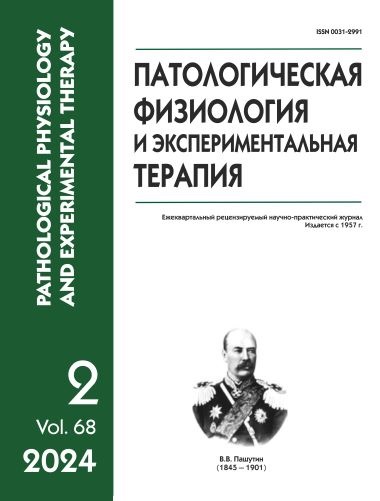Evaluation of serum angiogenesis factors in patients with pelvic venous incompetence
Ангиогенез у женщин с первичным варикозом вен малого таза
DOI:
https://doi.org/10.25557/0031-2991.2024.02.20-27Keywords:
pelvic venous incompetence; women; angiogenesis; angiogenesis inhibitors; matrix metalloproteinases; blood serumAbstract
The issue of angiogenesis (AG) in pelvic venous incompetence (PVI) is not sufficiently covered. A systematic approach to venous dilatation diseases, including from the point of view of AG, will expand the understanding of the pathophysiological mechanisms of PVV and encourage the search for new methods for its correction. Based on the above, the aim of this study was to evaluate the parameters of angiogenesis in women with varying degrees of severity of PVI. We examined 183 patients with PVI, divided according to the severity of the disease into 3 groups: group 1 (mild severity of PVI, n=79); Group 2 (moderate degree, n=63); Group 3 (severe, n=41). Data from 30 apparently healthy women as controls were used. The content of pro- and antiangiogenic factors in peripheral blood plasma was determined by enzyme-linked immunosorbent assay. The results of the study showed the presence of statistically significant differences in patients with stage 1 PVI in terms of higher values of angiogenin, PAI-1, reduced levels of PDGF and TIMP-1 relative to the control. Stage 2 patients had higher concentrations of angiogenin, MMP-8, MMP-9, PAI-1, decreased levels of PDGF and TIMP-1 compared to control values. The third stage of the disease was characterized by increased values of angiogenin, MMP-8, MMP-9, FGF, PAI-1, and decreased levels of PDGF and TIMP-1 compared to control data. These results can contribute to a more accurate assessment of the intensity and dynamics of progression of PVI in women in order to optimize diagnosis and develop correction methods.Downloads
Published
2024-06-20
Issue
Section
Original research
How to Cite
[1]
2024. Evaluation of serum angiogenesis factors in patients with pelvic venous incompetence : Ангиогенез у женщин с первичным варикозом вен малого таза. Patologicheskaya Fiziologiya i Eksperimental’naya Terapiya (Pathological physiology and experimental therapy). 68, 2 (Jun. 2024), 20–27. DOI:https://doi.org/10.25557/0031-2991.2024.02.20-27.






